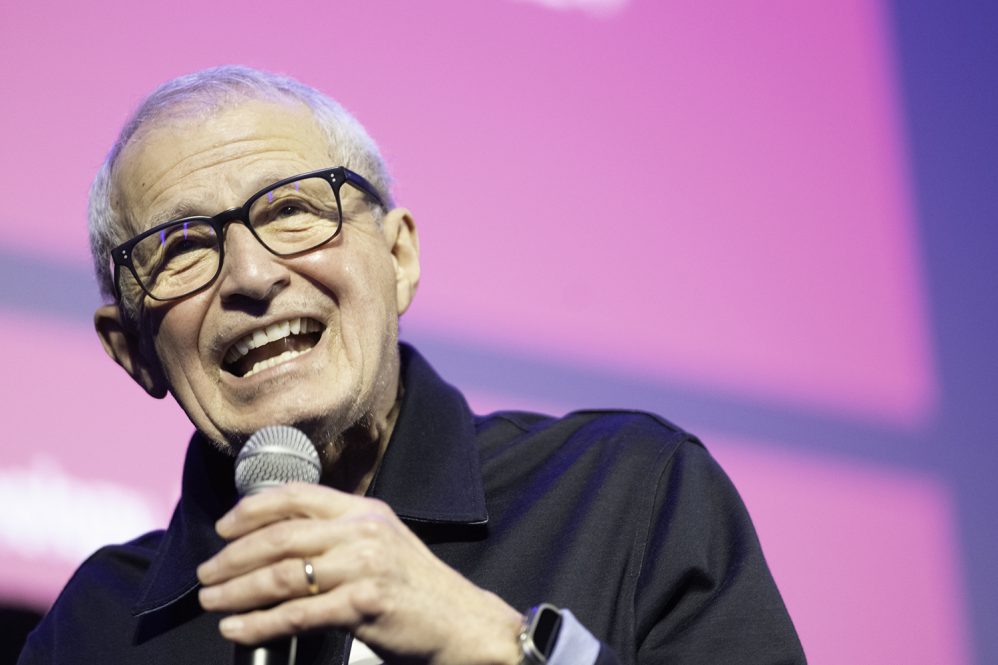As the former Executive Vice President of Innovation and Technology at IBM, Nicholas Donofrio had plenty of insight to share on technology, leadership qualities, and how people wrongly address their workplace challenges.
Donofrio spoke to 100 people—professionals, faculty and staff, and alumni and students–during the annual Rosenberg-McVay Business Leadership Series event on Tuesday night at UConn Stamford.
Donofrio spent 44 years at IBM, in increasingly senior roles, and then started his own consulting firm after he retired. He is the author of a book titled “If Nothing Changes, Nothing Changes: The Nick Donofrio Story,’’ which contains personal insights and his business advice, along with that of some 37 other highly accomplished business leaders. Most recently, he has served as a member of the Connecticut Legislative Task Force on Artificial Intelligence.
In his speech, titled, “Innovating for Tomorrow: If Nothing Changes, Nothing Changes,’’ Donofrio emphasized the importance of business and professional evolution in a quickly changing world.
“Everything is being driven by technology. Whether you like it or not, you’re in an AI world,’’ he said. “Last year you may not even have known what AI was. It’s the way the world is going, and you’re not going to stop it.’’
While the state of Connecticut needs to be prepared, so does its workforce. Not everyone is Steve Jobs or Elon Musk, he said, but everyone will need to rise to the challenges of their industry.
“Understand full well that in the future you will be judged less by what you know and more by how you address what you don’t know,’’ he said. “How will you stay up to date? How will you stay current?’’
An Innovative Mindset
Raised in a traditional Italian family, Donofrio said his parents were loving but also very disciplined. His father, who worked three jobs to support the family, seemed to apply more pressure on Donofrio than he did to the other siblings. His father always urged Donofrio to achieve more, weather by doing a better job maintaining the family’s garden or becoming more successful at school despite his straight As.
One day, Donofrio, then a high school student, asked his father why he was so tough on him, and his dad responded: “If nothing changes, nothing changes.’’ It became his son’s lifelong motto.
“It sounds like simple stuff, but coming from my father this was profound,’’ Donofrio said. “These words were impressed on me and never left me, because he’s right.’’
From his father’s lesson, Donofrio learned to develop an innovative mindset and he urged the audience to do the same. Too many people think they have one big, great idea and that becomes their focus. But Donofrio said that business approach is all wrong.
“Start with the problem, not with the answer,’’ Donofrio told the audience. The search for solutions should be inclusive, open, collaborative and broad-based. For many years IBM was the top patent-producing company in the world, but that’s not the most important thing, he said.
The heart of every business should be value creation—whether it is social, political, educational, or something else. If it has no value to people, it lacks purpose.
Leaders Need Courage of their Convictions
As a corporate leader, Donofrio said his ‘real job’ was simply to listen to his team members and fight for them until they could bring their vision to fruition.
“It’s easy to speak; listening skills are something far too few leaders have,’’ he said.
When a member of the audience asked how to address a philosophical disagreement with management, Donofrio urged them to take a stance, something he thinks is lacking in many businesses.
“Too many leaders don’t do anything,’’ he said. “Ten thousand people get laid off and it’s ‘no one’s fault.’ Having the courage of your convictions means you say, ‘That’s my mistake and I’ll fix it.’ Stand up, and lead the charge, and move forward.’’
He recalled a conversation he had with his mother in the 1980s. IBM had laid off 35,000 people in the Hudson Valley, including some members of his extended family. His mother was very upset with him.
“I told her, ‘Now would be a good time to stop telling people, ‘My son is an IBM executive!’ ’’ he said. “But if we didn’t do it, the other (remaining) 35,000 would be gone too.’’
Donofrio emphasized the need for inclusivity in business. Talent, he said, is uniformly distributed, but opportunity is not. An inclusive team is one of the keys to success.
“If you’re going to be innovative, you must have a diverse team,’’ he said. “You don’t know who has that last piece of the puzzle.’’



